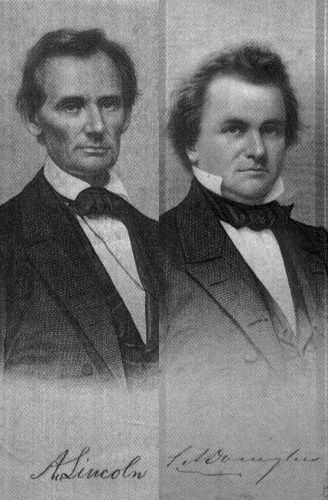It cannot be repeated too often: nothing is more fertile in marvels than the art of being free, but nothing is harder than freedom’s apprenticeship.
(Volume I, Part 2, Chapter 6)
Alexis de Tocqueville
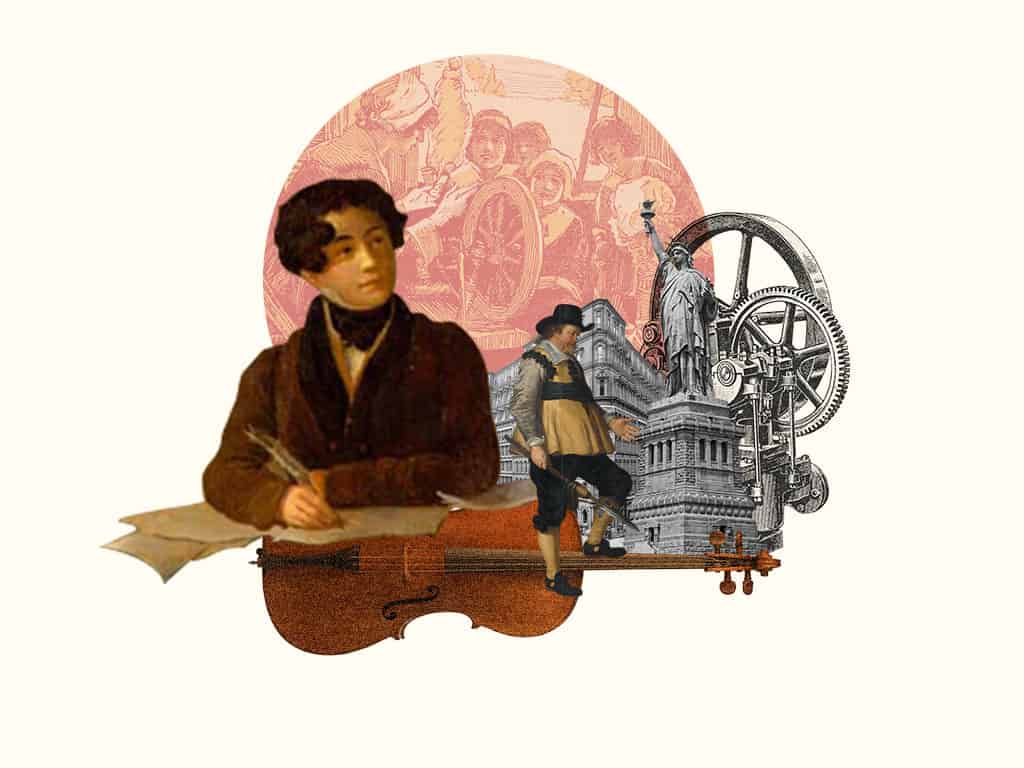
Democracy in America
Alexis de Tocqueville
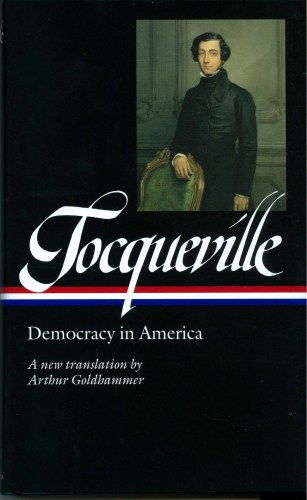
Alexis de Tocqueville, Democracy in America. Translated by Arthur Goldhammer. Published by The Library of America, 2004. ISBN-13: 978-1931082549
Tocqueville believed that democracy in the United States succeeded because of its long-standing tradition on individual sovereignty that not only characterized American politics but also culture.
Alexis de Tocqueville examines how the United States developed a stable and advanced democratic society by the early-1830s. Having witnessed several failed attempts at democracy in France, Tocqueville expressed fear of the democratization process, though he understood that monarchical and aristocratic power was in decline. Tocqueville believed that democracy in the United States succeeded because of its long-standing tradition on individual sovereignty that not only characterized American politics but also culture. The long-standing tradition in the United States can be traced back to the establishment of Puritan New England where the Pilgrims established a government where the people enacted laws, elected their own officials, and appointed magistrates. To Tocqueville, this not only laid the foundation for democracy in the United States, but also the foundation for local government. Over time, the emphasis on individual sovereignty grew and expanded, as illustrated by the system of federalism that developed under the United States Constitution. Federalism allowed federal, state, and local governments to share power over certain responsibilities like taxation. However, at the same, federalism reserved certain powers to one entity but not the others. Tocqueville believed that this protected individual liberty and encouraged people’s active involvement in government and politics. Democracy has also influenced the arts and sciences in the United States. For example, Tocqueville believed that democracy has influenced Americans to focus on material and economic improvements. Democracy has also influenced Americans to embrace direct, practical solutions. As a result, poetry, literature, philosophy, and the sciences in the United Sates lagged behind most of the world. To be sure, Tocqueville sees problems with American democracy. He feels that Americans, through their ability to elect individuals to government positions, have too much confidence in their elected officials. As a result, elected officials have too much power, leading Tocqueville to fear for what he saw as the “tyranny of the majority” that would undo the rights and liberties of the minority. However, Tocqueville feels that the Americans have instituted ways to offset tyranny of the majority through laws, juries, and political associations. While Tocqueville believes France and other European nations should not try to replicate American democracy, he nonetheless feels that it is tremendously powerful.
Why This Text is Transformative?
Alexis de Tocqueville’s Democracy in America allows students to grapple with complexities and paradoxes associated with democracy and democratic government.
Alexis de Tocqueville’s Democracy in America allows students to grapple with complexities and paradoxes associated with democracy and democratic government. Furthermore, Democracy in America allows students to explore how democracy has changed in the United States over time. Tocqueville’s purpose for writing Democracy in America is to examine why democracy worked in the United States by the early-nineteenth century, while previous attempts in France failed. Tocqueville’s purpose will require students to examine how certain social, economic, and political conditions in individual nations can influence the success and failure of certain forms of government. After all, while Tocqueville believes American democracy is powerful, he did not recommend that France or other European nations try to mimic it. Moreover, Democracy in America in America will allow history and political science students to examine how people defined democracy in the early-nineteenth-century. In doing so, students will the see the paradoxes associated with a democratic society. They will have to grapple with a society professing to be democratic while groups like women and African Americans not treated equally. In fact, Tocqueville identified how men and women in the United States were kept in separate spheres. Women at the time Democracy in America was first published were encouraged to stay in the private or domestic sphere. At the same time, Tocqueville believed slavery represented the biggest threat to American democracy.
Democracy in America also has relevance within the framework of American society today. Students can examine at Tocqueville’s impressions of American democracy and compare them to American democracy and government today. For example, Tocqueville believed that the tyranny of the majority posed a major threat to American democracy during the nineteenth-century. However, with institutions like the Electoral College, students will have to think about whether a tyranny of the minority exists in American government. Furthermore, students will also have to examine how power dynamics within the federal government has changed. Tocqueville noted how the legislative branch wielded tremendous power during the nineteenth-century. However, today, the executive branch seems to hold considerable power.
Lastly, Democracy in America can allow students to examine how democracy has influenced the science and cultural norms in the United States. Tocqueville believed that democracy had a hand in limiting the scientific and cultural contributions in the United States. Students will be able to examine why the United States lagged behind most of the world in terms of science and culture. While Tocqueville pointed to America’s democratic heritage, students can debate the merits of that position. The United States was not the scientific or cultural center of the world in the 1830s, but it is today. Students will be able to examine if democracy had any role in this transformation.
A Focused Selection
Study Questions
Our Social State: Individualism, Joylessness and Isolation
Vol. II, Part Two: Chs. 1-17
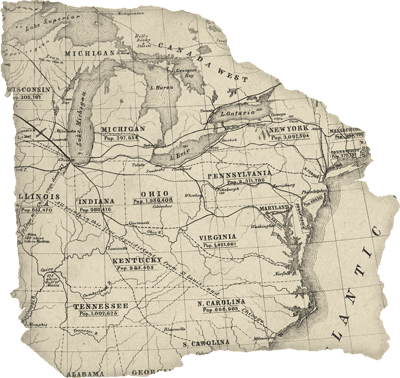
1. What threats do Individualism and the myopic pursuit of material well being pose for democracies? What structural, institutional and/or cultural guardrails does Tocqueville observe that contain these problems, and do you see them functioning in that way in contemporary America ?
2. For Tocqueville, “Love of well-being has become the national and dominant taste….” (507). But on the Sabbath, “when the seventh day of each week arrives, the commercial and industrial life of the nation seems suspended; all noise ceases” (517). What does Tocqueville see as the value in this? Do you observe a Sabbath (or a religious day of rest)? If not, are there things that you do that resemble it?
3. What goals do you have that require considering people over 100 years into the future? Why does Tocqueville think it’s important for people in democratic countries to have such goals?
4. The internet and social media have had a profound effect on the lives of people in the US. Imagine if Tocqueville were to travel to the US today and observe how you and your friends use technology, and in particular how you use your phones. What would he have to say about that? Find two quotations from the pages assigned for today and remix them to express what might have been Tocqueville’s views, and explain why you think Tocqueville would come to these conclusions. Remixing a quotation for this assignment involves adding and/or deleting words to make the quotation reflect what would likely have been Tocqueville’s view of something he did not directly observe. Be creative, but also be able to justify your creative choices.
These questions were created in collaboration with the participants of TGQF’s Summer 2024 Workshop One. Find more HERE.
Building Bridges
Alexis de Tocqueville’s Democracy in America can be paired with Aristotle’s Politics and Debate 7 of the Lincoln-Douglas debates. Democracy in America and Politics show how texts from different time periods and geographical divides can speak to each other over ideas of citizenship and the problems that prevent societies from forming the ideal community. Furthermore, Democracy in America and Debate 7 speak to each other as both highlight the problems slavery posed to American democracy.
Supplemental Resources
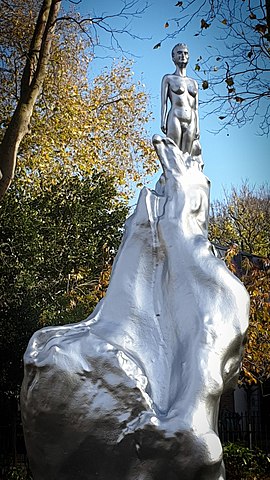
A Sculpture to Mary Wollstonecraft in Newington Green, London. It was sculpted by British artist Maggi Hambling. It was unveiled on November 10, 2020.By Grim23 - Own work, CC BY-SA 4.0
What did Mary Wollstonecraft write about in A Vindication of the Rights of Woman?
Dangerous Minds Episode 4 - Mary Wollstonecraft
Text Mapping
Discipline Mapping
History
Philosophy & Religion
Political Science/Government
Page Contributor


